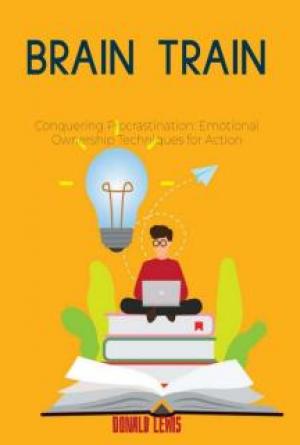TABLE OF CONTENTS
Introduction: Understanding Depression
Chapter 1: Avoiding Depression
Chapter 2: Depression May Be a Sign Of Something More
Chapter 3: Coping
Chapter 4: Take The Bull By The Horns
Chapter 5: Before It's To Late
Chapter 6: Seasonal Affective Disorder
Chapter 7: Andropause And Depression
Chapter 8: Depression And Suicide
Chapter 9: Yes You Can
Chapter 10: Laughter Is the Best Medicine
CONCLUSION
More Books
Chapter 1: Avoiding Depression
Depression is a serious illness that can affect the work power, family and social life of a person. This is why we don’t have to ignore it and hide it. It is important to know the symptoms, the causes and what possibilities we have to prevent it.
Each one of us had at some point a depressing sad moment. Depression is a normal human reaction associated to a loss, with the tumult of everyday life or with an agitated sentimental life. Sometimes the sadness sensation passes but sometimes it doesn’t, it becomes more persistent and it can conduct to nervous breakdowns. The diseases of the nervous system are very serious and that is why it is important not to pass them by without proper help when we realize we can’t handle them by ourselves. Getting help is not only normal, but required also.
Here are some of the symptoms of depression:
- sadness
- loosing energy
- loosing hope in life and others
- not finding pleasant anymore the things you used to love
- having trouble concentrating
- uncontrolled crying
- headaches, other types of inexplicable aches and itches
- needing to sleep a lot or on the contrary not getting any sleep at all
- loosing appetite and loosing weight at the same time
These are just some of the symptoms of depression and if more of them are associated they are not to be ignored and a discussion with a close person or a specialist has to happen very soon.
What causes depression? There is not a single source that causes depression. This is a complex disease that can appear as a result of multiple causes. Depression can also be transmitted among persons that are close to each other, by influence.
There are proofs that say persons suffering of depression suffer brain changes. There are also proofs that explain how depression can also be genetic. Children affected by the depression of their parents or parents whose children suffer from chronic depression are more likely to be affected themselves by this illness.
To try and prevent depression we have to know ourselves very well. Although treatable depression can be hard to prevent once we are already melancholic. The best method to avoid another crisis after a chronic depression is to keep and eye open to its symptoms and its causes. And also get professional hope whenever we feel like we need it.
Depression is often described as a psychological disease. There are several types of depression, ranging from mild to severe. It’s hard to identify factors that cause depression. However there have been many studies done to try and understand the underlying causes of depression to help prevent it. Moreover, more studies have been performed on what type of medical assistance helps to treat depression best.
The most noticeable symptom of depression is feeling sad for a long period of time. This involves feeling sad for at least two weeks. However, with most depressed people, this symptom lasts for much longer. This symptom in itself brings on many other conditions; for example, feeling sad may trigger suicidal thoughts.
Generally, two types of suicidal people have been identified: those who are serious about it and those who want attention. This is not to say one type is more severe than the other – both require attention and care by close relatives, friends and professionals. In the beginning, most people with depression are not serious about it, but suicidal thoughts are triggered by their long depression period. They may show this through reading many books and other materials on the subject of suicide. They may start talking about it more often in daily conversation. These are all signs that they are thinking of suicide and want some help. In fact, it’s very important to talk to them about it, even casually, to show them that you have interest in their lives.
Contrast this with the most serious suicidal people – these people do not talk or mention their suicidal tendencies because they’d like to act on them and they want no one to ruin their plan. These people can be helped too. They require more attention, especially more medical and professional attention. Simply talking to them about suicide may not help.
Depression has many other symptoms that vary from person to person. Some people may lose their appetite or gain more appetite. They may lose or gain weight unexpectedly. They may start forming different habits – like listening to different music or gaining new friends. Of course, this isn’t a sure sign of a depression, but when many of these elements are combined they may be warning signs.
Depression may have different causes for different people. Some major reasons for depression have been identified, like social isolation, substance abuse, stress, a death in the family and disability. When more than one symptom occurs at the same time, the risk of depression is higher.
When trying to help others with their depression, be very empathetic. They may need more attention and support, but they don’t need anyone telling them how to feel and that life is rosy. Everyone can escape depression given the right conditions.

Chapter 2: Depression May Be A Sign Of Something More?
Have you taken more than one antidepressant but are still feeling depressed? Are you frustrated that your depression keeps coming back? You are not alone. Many people are first told that they have depression or anxiety when, in fact, they actually have a different medical condition. Of these people, one in two will first be told they have depression, one in four will be told they have anxiety.
Why Does Your Depression Keep Coming Back?
There are a number of reasons why symptoms of depression may persist despite taking medication. One of these reasons may be because patients don't always remember to tell their doctors about all the symptoms they're experiencing. For example, patients may talk to their doctors when they feel down or depressed and are looking for relief. They may not talk about the times when they've felt really good or energetic. In fact, patients often think about these times as their "good times" or "normal times." This is important information that can help your doctor make a correct diagnosis and provide treatment that may help you feel better.
Help Your Doctor Help You
Getting a correct diagnosis is the first step to finding a treatment that is right for you. Bipolar depression is a form of depression that requires a different kind of treatment. If you have questions about bipolar depression, be sure to talk with your doctor. Several treatments, including some new medications, along with support from your doctor, can help people manage their symptoms over time.
What Is Bipolar Depression?
Bipolar depression is one part of bipolar disorder, a chronic-but treatable-illness. Sufferers usually have episodes of depression ("lows") and episodes of increased energy, racing thoughts or anxiety ("highs"). Untreated bipolar depression can affect an individual's ability to function at work, participate in social activities and maintain relationships. Getting an accurate diagnosis and the correct treatment can help patients with bipolar depression manage their symptoms and lead productive lives.
Neurotransmitters may also be an issue.
Neurotransmitters are powerful chemicals that regulate numerous physical and emotional processes such as cognitive and mental performance, emotional states and pain response. Virtually all functions in life are controlled by neurotransmitters. Interactions between neurotransmitters, hormones, and the brain chemicals have a profound influence on overall health and well-being. When our concentration and focus is good, we feel more directed, motivated, and vibrant. Unfortunately, if neurotransmitter levels are inadequate these energizing and motivating signals are absent and we feel more stressed, sluggish, and out-of-control.
Disrupted communication between the brain and the body can have serious effects to ones health both physically and mentally. Depression, anxiety and other mood disorders are thought to be directly related to imbalances with neurotransmitters. Some of the more common neurotransmitters that regulate mood are Serotonin, Dopamine, and Norepinephrine.
Serotonin imbalance is one of the most common contributors to mood problems. Some feel it is a virtual epidemic in the United States. Serotonin is key to our feelings of happiness and very important for our emotions because it helps defend against both anxiety and depression. You may have a shortage of serotonin if you have a sad depressed mood, anxiety, panic attacks, low energy, migraines, sleeping problems, obsession or compulsions, feel tense and irritable, crave sweets, and have a reduced interest in sex. Additionally, your hormones and Estrogen levels can affect serotonin levels and this may explain why some women have pre-menstrual and menopausal mood problems. Moreover, stress can greatly reduce your serotonin supplies.
Dopamine and Norepinephrine are responsible for motivation, energy, interest, and drive. They are associated with positive stress states such as being in love, exercising, listening to music, and sex. These neurotransmitters are the one’s that make you feel good. When we don’t have enough of them we don’t feel alive, we have difficulty initiating or completing tasks, poor concentration, no energy, and lack of motivation. Low neurotransmitter levels drive us to use drugs (self medicate) or alcohol, smoke cigarettes, gamble, and overeat. For many years, it has been known in medicine that low levels of these neurotransmitters can cause many diseases and illnesses. A neurotransmitter imbalance can cause Depression, anxiety, panic attacks, insomnia, irritable bowel, hormone dysfunction, eating disorders, Fibromyalgia, obsessions, compulsions, adrenal dysfunction, chronic pain, migraine headaches, and even early death.
What causes neurotransmitter dysfunction?
• Prolonged periods of stress can deplete neurotransmitters levels. Our fast paced, fast food society greatly contributes to these imbalances.
• Poor Diet. Neurotransmitters are made in the body from proteins. Also required are certain vitamins and minerals called “cofactors” If your nutrition is poor and you do not take in enough protein, vitamins, or minerals to build the neurotransmitters, a neurotransmitter imbalance develops. We really do think and feel what we eat.
• Genetic factors, faulty metabolism, and digestive issues can impair absorption and breakdown of our food which reduces are ability to build neurotransmitters.
• Toxic substances like heavy metals, pesticides, drug use, and some prescription drugs can cause permanent damage to the nerves that make neurotransmitters.
• Certain drugs and substances such as caffeine, alcohol, nicotine, NutraSweet, antidepressants, and some cholesterol lowering medications deplete neurotransmitter levels leading to neurotransmitter imbalances.
• Hormone changes cause neurotransmitter imbalances
Testing is now available to detect Neurotransmitter Imbalances.
Basing a treatment on symptoms alone (traditional medicine) will not provide the information needed to address the underlying imbalance. A visit to a doctor or practitioners office for depression involves telling them how you have been feeling emotionally. The typical depressed person leaves the office with a prescription for an antidepressant without ever having any conclusive laboratory evidence of what is causing their symptoms. New sophisticated equipment and tests are now available to evaluate neurotransmitter imbalances using a urine or blood sample. This provides a neurotransmitter baseline assessment and is useful in determining the root causes for diseases and illnesses such as those mentioned above. Laboratory analysis can now provide precise information on neurotransmitter deficiencies or overloads, as well as detect hormonal and nutrient co-factor imbalances which influence neurotransmitter production. Individuals require individual solutions. Testing helps to determine exactly which neurotransmitters are out of balance and helps to determine which therapies are needed for an individualized treatment plan. It also helps in monitoring the effectiveness of an individual’s treatment.
Treatment
Nutrient therapies greatly increase the levels of neurotransmitters that a person has been found to be deficient in. Studies have shown that it is both safe and effective. These nutrients will cross the blood brain barrier into the brain where they will be synthesized into neurotransmitters and this will raise the number of neurotransmitter molecules needed by the brain. They are prescribed according to the results of laboratory testing giving the imbalanced person a more individualized plan of treatment.
Prescription drugs such as antidepressants do not increase the overall number of neurotransmitter molecules in your brain, they merely move them around or stop the breakdown. If your levels are too low to start with, medication may work initially, then “poop out” or not work from the beginning. There is also the issue of side-effects and more recently the FDA warning that SSRI antidepressants could cause suicidal thoughts in some children, teens and adults.
There are specialized nutrient formulas which help antidepressant medications work more effectively. Under the supervision of a trained practitioner these treatments may be used in addition to the persons existing medication to boost their effectiveness or to target another neurotransmitter that is also causing symptoms. Many antidepressant or anti-anxiety medications just target one neurotransmitter but many mental health disorders involve multiple neurotransmitters.

Chapter 3: Coping
Depression is a universal phenomenon and quite possibly there is no one on the face of earth who has not gone through the course of depression at least once in his or her lifetime. When someone is in a love relationship, the chances of suffering from depression become higher.
It is very important to know different strategies for coping with depression, otherwise the depressed person may end up making fatal decisions in their life. This article focuses on discussing different strategies in the format of tips with the purpose of educating the readers to cope with episodes of depression in their life.
Here are a few tips on how to cope with depression.
Build Your Knowledge about Depression
The first and most important thing for coping with depression is to understand all the necessary details about depression, its causes and effects, symptoms and treatments. For that purpose, you may consult with doctors specializing in mental health or you may depend on mental health journals. Apart from that, there are huge resources available on the net which can offer you plenty of information for depression and different strategies for coping with depression.
Learn How To Discern the Difference between Myth and Reality
The next important step for coping with depression is of course to increase your knowledge about the significant differences among myths and reality concerning depression and its different aspects. Many people believe that depression is not a treatable disease; hence there is no question of any specific possible treatments. Some people simply label it as an experience of ordinary sadness; however, the fact is totally different. In fact, depression is a complex process and if not encountered at early stages, it may get out of hand and even cost lives..
Value Yourself and Your Unique Presence
Sometimes when we are in a relationship, we simply forget to value our own existence and unique identity by putting our family members first, which results in suffering from inevitable depression from identity confusion and identity distortion. You should respect yourself and know how to value your own decision and actions in a rational fashion. Set some time aside for yourself, give yourself a reward as an appreciation of your efforts, While coping with depression, you should first look at yourself from a dignified perspective.
Watch Out the Warning Signs
The behavior of a depressed individual is not the actual behavior. The common behaviors are withdrawn, shy, sullen and angry. Before coping with stress, try to identify the warning signs of depression in you and your partner. Most commonly, a depressed person experiences sudden outbursts of anger. In fact, they actually show their anger to themselves and their own mental state, although seemingly appear towards environment.
Seek Help and Treatment
Depression is a real disease and it is absolutely treatable. Similar to other illnesses, depression may get worse day by day if proper treatment has not been administered on time. There are various self-help groups around the world, who offer their unconditional support to the depressed individuals and help them coping with depression. If you are experiencing episodes of depression, it is better that you should visit these self-help groups. Additionally, you may also consult with doctors and mental health practitioners for possible treatments.
Anxiety can also lead to depression.
Anxiety is a part of everyone’s life. There are different ways of dealing with different of anxiety owing different causes. Proper treatment and support can help a person to deal with their anxiety in a better way and making living with it better. And with time one can find himself or herself free from the majority of their issues.
Causes and types
Anxiety is mainly of two types. One type is that type of anxiety with which you can deal and the other type is worsened form of anxiety which leaves a mark on your personality. The first type of anxiety is easy to deal with. Support from your near and dear ones can help you to come out of your anxiety or you can always deal with it on your own, without needing any support. But the second type of anxiety requires some effort to make living easy. The first thing that is needed to be done is to determine which the type of your anxiety is and then find out the root cause of it.
Causes for anxiety can be external as well. So in order to deal with your anxiety in a better way you need to find out whether your anxiety is caused due to an external factor or not. Any bitter incident which took place in your past life can be the cause or sometimes it can be an indistinct intuition that something is not right but if your anxiety is due to some external factors then you should work towards dealing with it. However there is no obvious external cause for anxiety reactions to life.
Studies are still conducted to find out the cause of anxiety in people who don’t have any reasonable past traumatic experience which could lead to anxiety. People with deep rooted anxiety may have chemical imbalances in their brains for improper registration of neuro chemicals. However you should be aware that it is not a proven fact with any concrete evidence. A relatively new study conducted in 2005 showed that it is possible to do a normal blood test to find out the chemicals present in the brain which can cause anxiety.
Symptoms
More or less all the anxiety symptoms are quite well known because over the years people have experienced anxiety. The usual symptoms are prolific sweating, ‘lump in the throat’, palpitations, twitching, dry mouth, chest pain and shortness of breath or wheezing. However these symptoms can exist as side effects of some other medicines or some other psychological issues. When linked to a phobia, as opposed to being ‘general’ anxiety disorder, the symptoms normally only happen in reaction to explicit stimuli.
Treatment
Groups like Toastmasters International helps you with specific anxieties that have not yet reached a weakening stage. After you notice the anxiety symptoms in yourself you must consult a psychiatrist or a professional health professional.
A qualified mental health professional can assess your anxiety, diagnose your psychological issues, and plan a course of treatment that suits you best. If you detect that your anxiety is reaching a bad stage then at once you must seek advice from your doctor. So that there are full chances of your recovery. If you have full support from your family and from all those people who understands you can help you treating your anxiety. Thus you can cope with anxiety in a better way and your recovery will be quick and complete.
Journaling, therapy, group sessions, or medication are the various methods of treatment. However cognitive-behavioral therapy is the most common type of therapy. In this kind of treatment the mental health professional aids the patient in shagging the ways of thinking that contribute to the cause of anxiety. The professional then introduce the patient to the situations that helps in controlling their anxiety. Common types of medication include anxiolytics such as Selective Serotonin Reuptake Inhibitors (SSRIs) and Monoamine oxidase inhibitors (MAOIs) are the common medicines and also tricyclic anti-depressants, though these days those are prescribed less often. It is seen that over 90% of patients get recovered by availing these treatment options.
Who doesn’t go through problems in life? From the worry of bills to be paid, traffic, work, taking care of our families. Gosh…the demands of modern-day life seem so overwhelming. It’s no wonder several people are left dealing with depression in a quest to cope with these burdens.
Sometimes, these demands of life may aggravate strong emotions within us such as worry, fear, rage, hopelessness. Coincidentally, these are all symptoms of depression and as a consequence, dealing with depression remains a task that most of us have to undertake on a daily basis.
However, one very overlooked method of depression help and coping with its symptoms is quite simply a fast. It’s as old as the mountains and perhaps nothing comes close to restoring one’s emotional balance when dealing with depression as this powerful tool.
An observance of nature will show us that when animals are frightened or angered, they abstain from eating until after the passage of some time. Moreover, it is true that under stressful circumstances many civilized people refrain from eating and find in truth









